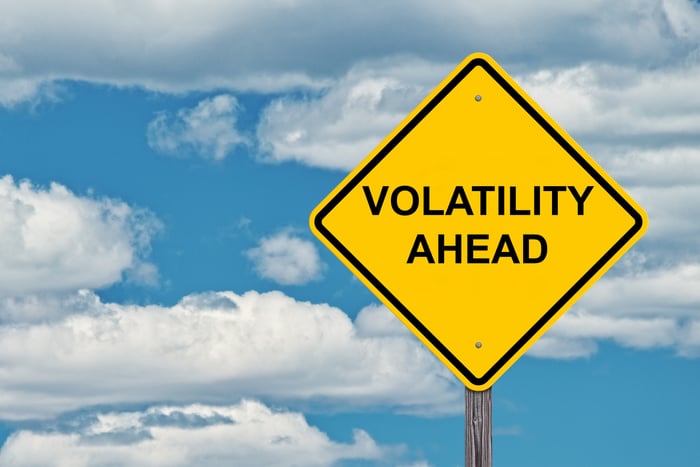The Ultimate High-Yield Oil Stock to Buy With $500 Right Now
The price of Brent crude, a key global oil benchmark, has fallen by around 20% in the past seven months or so. That's a pretty big move but, historically speaking, such slides aren't all that unusual in the energy sector. That's why long-term income-focused investors would be well advised to buy shares of energy companies that are built to keep distributing large dividends even during periods of big commodity price swings.
Right now, the best stock pick from that elite group is probably Chevron (NYSE: CVX). Here's why.
What do integrated energy giants like Chevron do?
Chevron is one of the largest energy companies on the planet -- but that description doesn't really do it justice. Just saying "energy" is too vague because the energy sector is divided into three major segments: upstream (oil and natural gas production); midstream (energy transportation); and downstream (chemicals and refining).
Many energy companies operate in just one of these areas. Chevron and its integrated peers operate across all of them. This is important because the upstream, midstream, and downstream segments all have different business dynamics.

Image source: Getty Images.
The upstream and the downstream both tend to be volatile, with results driven by commodity prices. But the downstream segment often benefits when the upstream is suffering because oil and natural gas are key inputs into the chemical and refining businesses. Midstream assets, like pipelines, are largely toll-taking operations, so they usually perform fairly consistently over time.
Essentially, operating in all three areas helps integrated energy companies even out their business performances across the energy cycle. They will still have peaks and valleys, but they won't be quite as extreme as those experienced by companies that are only working in the upstream or the downstream arenas.
This is why more conservative investors looking at the energy sector should probably stick with integrated energy giants. The list of options generally includes Chevron, ExxonMobil (NYSE: XOM), Shell, BP, and TotalEnergies.
There are other integrated energy companies, like ENI, but national governments tend to have material ownership stakes in those companies, which can lead to decisions that are less shareholder friendly (and more government friendly).
Chevron is the best value in the integrated energy group today
With so many options, why should an income investor choose Chevron?
The first reason is the company's dividend history. BP and Shell both cut their dividends during the early days of the pandemic. At the time, both said that was so that they could invest more in clean energy, but they have already walked back the renewable power commitments they made during that period. It seems more likely at this point that Shell and BP just wanted more financial breathing room. If you want a dividend stock you can trust, these two likely shouldn't make your list.
TotalEnergies made a similar clean energy commitment, but maintained its dividend. While that fact should keep it on your options list, there's a confounding fact here. TotalEnergies has not walked back its clean energy commitment and, in fact, has pushed fairly hard into the sector, effectively diversifying away from oil and natural gas. It is an attractive energy company, but one that's really most appropriate for investors who want to hedge their carbon fuel bets with clean energy exposure.
That leaves Chevron and ExxonMobil, both of which have really stuck pretty close to their historical petrochemical focus.

CVX Debt to Equity Ratio data by YCharts.
There are a number of important similarities between Chevron and ExxonMobil. For example, they have the two lowest debt-to-equity ratios among their closest peers. And both have increased their dividend payments annually for decades. These aren't unrelated facts. Because they have strong balance sheets, they can take on debt as needed during tougher times to support their dividends and their businesses. When the good times return, which they always have historically, they can reduce their leverage in preparation for the next down cycle.
So, if you are looking for a reliable dividend-paying energy stock, either Chevron or ExxonMobil could fit the bill. But at their current share prices, Chevron's dividend yield is 4% while ExxonMobil's yield is 3.2%. With similar businesses but meaningfully different yields, Chevron stands out as the more attractive high-yield energy stock right now.
Prepare for the worst with energy stocks
The most important factor in the case for buying Chevron is that it has proven that it can weather the ups and downs of the energy sector. The secondary element is that, comparing it to its closest peer ExxonMobil, it has a more lucrative dividend. It wouldn't be wrong to buy ExxonMobil, but if you are trying to generate the most income with a $500 investment (or a $500,000 investment), Chevron simply looks to be the more rewarding pick today.
Don’t miss this second chance at a potentially lucrative opportunity
Ever feel like you missed the boat in buying the most successful stocks? Then you’ll want to hear this.
On rare occasions, our expert team of analysts issues a “Double Down” stock recommendation for companies that they think are about to pop. If you’re worried you’ve already missed your chance to invest, now is the best time to buy before it’s too late. And the numbers speak for themselves:
- Nvidia: if you invested $1,000 when we doubled down in 2009, you’d have $352,678!*
- Apple: if you invested $1,000 when we doubled down in 2008, you’d have $44,102!*
- Netflix: if you invested $1,000 when we doubled down in 2004, you’d have $466,805!*
Right now, we’re issuing “Double Down” alerts for three incredible companies, and there may not be another chance like this anytime soon.
See 3 “Double Down” stocks »
*Stock Advisor returns as of November 25, 2024
Reuben Gregg Brewer has positions in TotalEnergies. The Motley Fool has positions in and recommends Chevron. The Motley Fool recommends BP. The Motley Fool has a disclosure policy.




